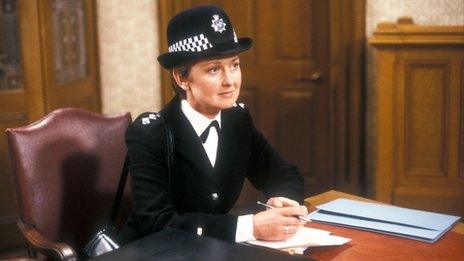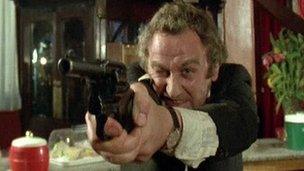Do cop shows tell the truth about policing?
- Published

BBC television series Juliet Bravo was popular in the 1980s
Fictional TV cop shows are all many people know about the workings of policing. But how accurate are they, asks Giles Edwards.
Most people, most of the time, do not have much contact with the police, and thankfully do not need to. But flick on your television and you will be assailed by cop show after cop show - the schedules are dripping with them - from Lewis to New Tricks.
According to Frank Leishman, professor of criminology at Newman University College, Birmingham, cop shows are an important factor in influencing how we think about the police.
And because the people who make these shows really strive for realism, he argues that they do "fill in the gaps in the public's real understanding of police work".
Ian Kennedy-Martin, who created The Sweeney, The Chinese Detective and Juliet Bravo, agrees.
"When I used to go into a police series, the first thing I wanted to do was research, get the language right, always get the geography right," he says.
"If I'm going to write about a corrupt policeman, get the corruption right, and if I'm going to write about a good policeman, get that right too."
To get it right, he spent a lot of time with the police - often using storylines based on real cases - and he believes the shows he wrote accurately represented the reality of policing at the time.
If he is right, and if his fellow writers were as careful, then perhaps the changing face of British TV policing accurately represents the type of policing we have had over time.
Perhaps the consensual community policing of Dixon of Dock Green in the 1950s, the haring around in fast cars in The Sweeney in the 1970s, and the more balanced approach in The Bill in the 1980s each reflected the policing of its era.
But do they really get it right?
Many police officers complain about the inaccuracies, even if they understand that the purpose is entertainment, not documentary.
"They've got to be entertaining," acknowledges PC Murray Maclean of Thames Valley Police. "If tonight's episode was an hour of taking a statement and then two hours of court file preparation, I don't suspect we'd get many viewers."
Leishman agrees: "DI Jack Frost will solve two murders typically in a two-hour programme with only a stop for a sandwich break. You never actually see him doing any paperwork."

The Sweeney focused on two members of the Flying Squad, a branch of the Metropolitan Police
Rob Mason, the detective superintendent in charge of serious crime investigations for Thames Valley Police, reveals an even more serious flaw.
"As a rough guess, 90% of the people we deal with who are arrested for serious crimes make no comment in interview at all," he reveals.
But if the end-of-programme confessions are unrealistic, does it matter?
Ian Kennedy-Martin is sanguine about the dramatic licence he employs.
"A police series is a construct," he agrees. "It has a beginning, a middle and an end, it has to conform to 52 minutes."
But he goes on to offer a very interesting insider's take on our love affair with the TV cop show, and perhaps why there are so many of them.
"The reason it's there is first of all because there are three groups of people who can go into a situation, dramatic or otherwise, and legitimately ask questions," he says.
"Those are lawyers, doctors and policemen, and writers tend to find that the police are easier to research because every policeman has a lot of wonderful stories."
Are TV cop dramas, then, ultimately just incredibly engaging stories? After all, who in their right mind would move to Midsomer or Denton, or even the Oxford of Inspectors Morse and Lewis, with their terrifying number of serial killers?
Perhaps in our hearts we know that just like much other fiction, it is simply a pleasant escape.
According to Leishman, the viewing public "do make distinctions between reality and realism. We can overstate the effect that it has".
But there is one group in society for whom these shows are apparently compulsory viewing.
Ian Kennedy-Martin reveals that he got a call to tell him about who was watching the Sweeney.
"We got a report from Northern Ireland that the Ulster Constabulary was very pleased because between nine and 10 o'clock on a Monday night the crime rate went right down. The criminals were watching."